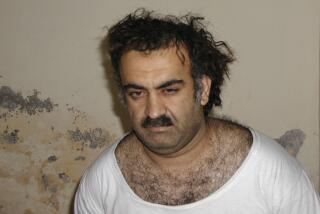Prosecutors will not appeal ruling in embassy bombing case
- Share via
Reporting from Washington — Federal prosecutors in New York on Sunday advised the judge in the Africa embassy bombing case that they will not appeal his ruling barring their key witness from testifying.
Even without the crucial testimony of Hussein Abebe, the prosecutors said in a letter to the judge, “the government is prepared to meet its burden of proving the defendant’s guilt beyond a reasonable doubt.” They asked that U.S. District Judge Lewis A. Kaplan resume jury selection Tuesday in the trial of Ahmed Khalfan Ghailani.
“Weighing all the circumstances, the government does not wish to delay the trial in order to take an appeal,” prosecutors said.
Ghailani, who had pleaded not guilty, is charged in the 1998 bombings of the American embassies in Kenya and Tanzania that killed more than 200 people, including a dozen Americans.
The case was jolted last week when Kaplan ruled that Abebe could not testify because prosecutors had learned of him from Ghailani, who mentioned him after being tortured in a secret “high-value” CIA prison, believed to be abroad. The judge ruled that Abebe’s ability to testify was tainted because his name came from Ghailani’s “coerced” statements.
Abebe was considered crucial to the government’s case because once investigators found him, he told the government that he sold TNT explosives to Ghailani that were used in the bombings.
Atty. Gen. Eric H. Holder Jr. has vowed that the case will go forward.
On Sunday, the New York prosecutors said in their letter that they “respectfully” disagreed with the judge’s ruling, and that “under different circumstances” it would merit review by the appeals court.
But, they said, an appeal could cause “a delay of uncertain, and perhaps significant, length” in a trial that has been long anticipated.
The prosecutors, led by Michael Farbiarz, gave several reasons for wanting to keep the case on track, even without Abebe’s testimony.
“Many foreign witnesses have already come to New York based on the original start date, and many more have made plans based on that date,” the prosecutors said. “They would be greatly inconvenienced by a delay of uncertain length, and some might even be unwilling or unable to return again for a later trial.
“Finally, many victims, who have long waited to see the defendant tried for his crimes, have already arrived in New York, some having traveled considerable distances.”
richard.serrano@latimes.com
More to Read
Sign up for Essential California
The most important California stories and recommendations in your inbox every morning.
You may occasionally receive promotional content from the Los Angeles Times.














